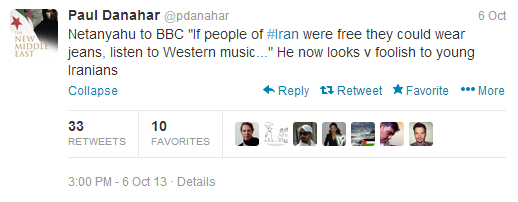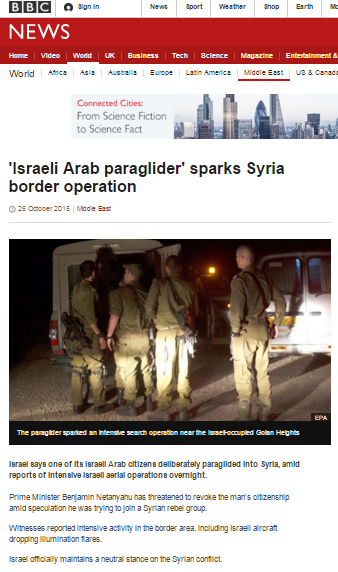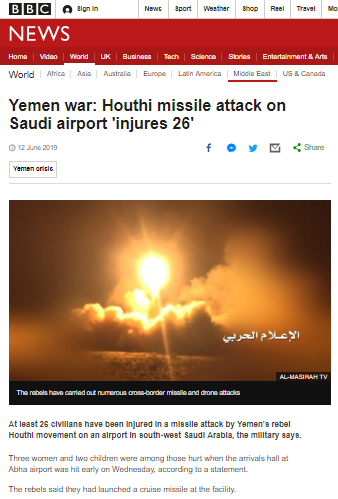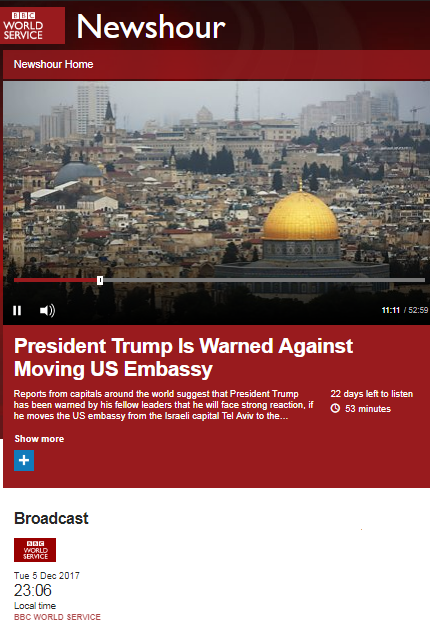As regular readers know, BBC audiences are all too used to reading and hearing whitewashed portrayals of the perpetrators of terrorism against Israelis but listeners to a report aired in the November 12th evening edition of the BBC World Service radio programme ‘Newshour’ encountered a new level of euphemistic jargon.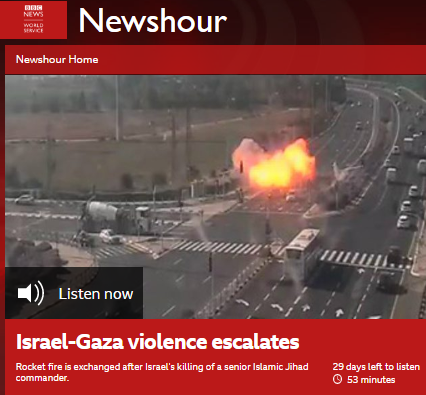
Titled “Israel-Gaza violence escalates”, the synopsis on the programme’s webpage tells audiences that:
“Rocket fire is exchanged after Israel’s killing of a senior Islamic Jihad commander.”
That portrayal of events of course does not clarify an important distinction: the fact that while Israel carried out strikes against purely military targets in the Gaza Strip, Palestinian terrorists carried out attacks against Israeli civilians. Neither was that point made clear during the entire nine-minute item.
The webpage is illustrated with an image described as follows:
“Picture: An image taken from CCTV video made available by Israel’s national roads authority showing the moment a rocket, apparently fired from Gaza, struck a road near the city of Ashdod, Israel, 12 November 2019. Credit: EPA / Netivei Israel.”
Although by the time the programme was aired terrorists in the Gaza Strip had fired over 190 rockets and mortars at Israeli cities, towns and villages as far north as Tel Aviv, listeners heard presenter Paul Henley claim in his introduction that “fighting” was taking place in one sole location.
[emphasis in italics in the original, emphasis in bold added]
Henley: “Coming up in a moment: fighting erupts again in Gaza after Israel kills a senior militant. That’s our top story.”
Henley introduced the item itself (from 00:45) thus:
Henley: “First, the killing by Israel of a senior Islamic Jihad commander in Gaza seems to have led to a significant escalation of violence in the dispute between Israel and militants in the Palestinian territories. Baha Abu al-Ata died along with his wife in a strike on his home. More than 150 rockets were fired from Gaza in retaliation and Israeli war planes have carried out more strikes of their own.”
Once again the BBC created a false sense of equivalence by failing to clarify that while the Israeli strikes targeted Palestinian Islamic Jihad rocket launchers and infrastructure, the rockets fired by the PIJ and other factions targeted Israeli civilians. Henley went on:
Henley: “Here are some views from the Israeli side.”
Listeners then heard two people speak very briefly (one with a voiceover translation) but were not told their names, their locations – Sderot and Netivot – or what actually happened. Henley next introduced “the BBC’s Barbara Plett Usher in Jerusalem”.
Henley: “She told me more about the man whose killing had sparked this latest flare-up in violence.”
Plett Usher: “He is a commander of the Palestinian Islamic Jihad in Gaza and he has been talked about quite a lot by Israeli military officials and in the Israeli press recently because they see him as somebody who’s ready to take risks, who is ready to operate independently and who’s quite forthcoming with the confrontational approach.”
Yes, that really was apparently the best that Barbara Plett Usher could come up with to describe a senior member of a proscribed, violent, radical Islamic terrorist organisation which seeks to destroy the State of Israel.
With the BBC having completely ignored the PIJ’s November 1st attacks on Israeli civilians, Plett Usher was then able to present an unnecessarily qualified account of the background to the story.
Plett Usher: “So they [Israeli officials] would blame him for many of the rocket attacks that have taken place in recent months and they say that he was planning more attacks imminently and therefore they had to act. They also say that…ehm…although Palestinian Islamic Jihad is backed by Iran, he has taken on that mantle more so than other such leaders and so they did see him as a threat.”
Henley then asked a rather pointless question to which he got an obvious answer.
Henley: “And when the Israeli leader Benjamin Netanyahu says that all this could prove a protracted conflict, what does he mean?”
Plett Usher: “I think he means that they were very aware when they carried out the targeted killing that Islamic Jihad would respond and that it has lots of rockets to do that and so I think he was telling the Israeli public that…to expect rocket attacks certainly over the next couple of days. That seems to have been the calculation of the Israeli Defence Forces. And then they’re hoping that it will not broaden out into a wider escalation. They have said quite clearly they do not want to escalate although they are prepared if that happens. And they have framed this very much as a strike about this man and these circumstances, that he was seen as a threat and they signalled quite strongly also to the main Islamist movement in Gaza, Hamas, which is governing Gaza, that this is a confrontation with Islamic Jihad. They…they seem to be signalling they do not want Hamas to join the conflict and they want to try and keep it focused in this narrow way.”
Henley: “And what has Hamas been saying?”
Plett Usher replied with a romanticised portrayal of Hamas’ agenda.
Plett Usher: “Hamas is in an interesting position…ahm…because it has a different strategy than Islamic Jihad. It is the governing body and it has in recent months and years been working at tacit truce arrangements with Israel in order to alleviate the humanitarian and economic suffering in Gaza. And Islamic Jihad under this commander has been disrupting that; challenging it with these rocket attacks. So what Hamas has said, so far together with Islamic Jihad, is that Israel has crossed red lines and that it will be responsible for the consequences but it’s not clear what action it will take, you know, it must be calculating whether further conflict – a wider war – is going to be something that the Gazans will be wanting at this point – I think almost certainly not – but at the same time it wouldn’t want to look like a collaborator when such a senior militant commander has been killed. So it has not made clear what action it will take.”
As readers have no doubt noticed, BBC World Service radio listeners had by this point not heard the words ‘terrorism’, ‘terror’ or ‘terrorist’ even once and had not been informed that rocket attacks on civilian targets in Israel are an act of terror. They did however hear an inaccurate portrayal of the current status of efforts to form a government in Israel and amplification of speculation.
Henley: “And what effects are likely on Israeli politics as Benjamin Netanyahu comes to the end of the period he’s allowed to form a coalition government?”
Plett Usher: “It is certainly happening at this very politically sensitive time because he twice failed to form a coalition government and now his chief challenger Benny Gantz is trying to do so and as you said his time is coming up. There have been accusations from centre-Left politicians and from Arab politicians that that’s the reason for the timing of this strike; that it was done for political reasons to bolster Mr Netanyahu’s image as Mr Security. He’s constantly said he’s the man Israel needs to keep the country safe and also as a way of dragging his opponents into a unity government saying ‘look, this is a security situation, you need to join a unity government with me in charge’ so that way he can keep his job. Mr Netanyahu has tried very hard to push against that view. He stressed that he took military advice and that the military was even pushing for this targeted killing and also the operation does seem to have a fairly wide backing from different political elements but having said that, it’s certainly not happening in a political vacuum and if it does escalate, if there does…if it does become something much bigger it would be hard to think that wouldn’t affect the political negotiations in some way.”
So as we see, in the first five minutes of this report BBC audiences were given little or no information about the size of the Palestinian Islamic Jihad faction in the Gaza Strip, the size of its arsenal, the source and scale of its funding or its agenda and ideology. They also heard nothing of significance about what was happening to Israeli civilians who had been under attack by terrorist organisations for seventeen hours by the time this programme was broadcast. The relevance of that will be discussed in a future post.
Related Articles:
BBC News avoids the word terror in report on strike on terrorist

